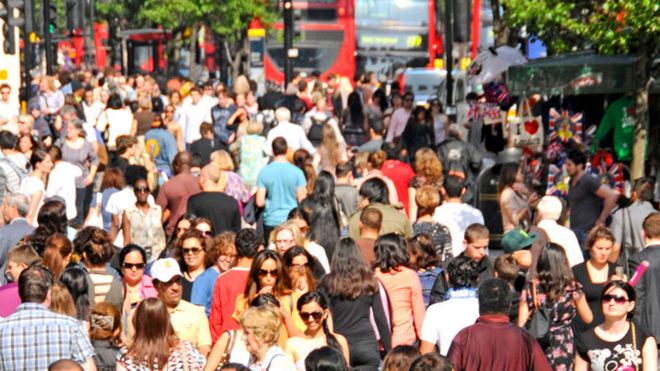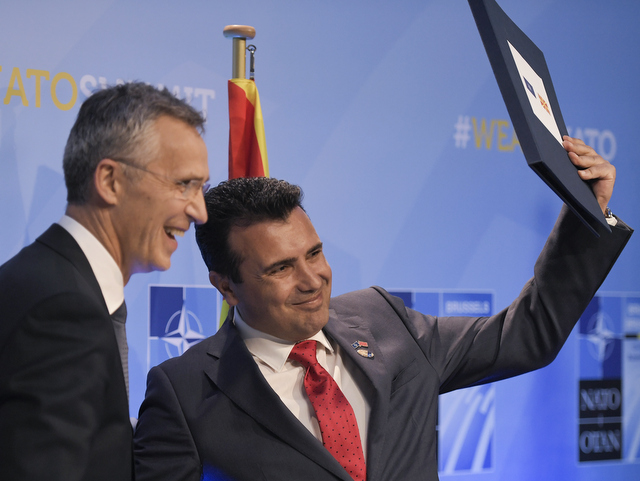Deustceh Welle (16 July 2018)
The lower house of the British Parliament passed the controversial trade bill after May gave in to hardliner demands. The prime minister has been struggling to find common ground within her own party over Brexit.
British Prime Minister Theresa May gave in to demands from her party's hardliners on Monday, accepting four amendments that would limit the government's ability to set up customs arrangements with the European Union after Britain leaves the bloc in March 2019.
Lawmakers in the lower House of Commons voted 305 to 302 in favor of the amendments to the Taxations (Cross-Border Trade) Bill and later passed the entire legislation in a 318 to 285 vote.
The amendments preclude the British government from collecting EU tariffs on goods that travel through Britain on their way to the bloc unless the EU also agrees to collect British tariffs on goods destined for Britain.
Who's who in Brexit?
May became prime minister after David Cameron resigned from the post in the wake of the Brexit referendum vote in June 2016. Despite her position, she has struggled to define what kind of Brexit her government wants. Hardliners within her Conservative party want her to push for a clean break. Others want Britain to stay close to the bloc. The EU itself has rejected many of May's Brexit demands
Sacrifice for a legislative win
The prime minister accepted the amendments in an attempt to save a vote on the cross-border trade and taxation bill, which appeared to be heading for a defeat before the vote.
Conservative lawmakers from the European Research Group, a coalition of up to 60 right-wingers in favor of a clean break with the EU, targeted the law to push the government toward a "hard" EU exit.
Downing Street defended the government's decision to accept the four amendments, saying that it was still consistent with previous government policy.
Hard or soft options
It's essentially a choice of a harder or softer Brexit. Harder prioritizes border control over trade. UK firms would pay tariffs to do business in the EU, and vice versa. The softest Brexit would see access to the single market, or at least a customs union, maintained. That would require concessions — including the payment of a hefty "divorce bill" — to which the UK has provisionally agreed.
Pro-EU conservatives disappointed
Opposition lawmakers and some Conservative Party members in favor of closer ties to the EU after Britain's departure rebuked May for accepting the amendments.
Pro-EU Conservative lawmaker Anna Soubry accused May of caving in because she was "frightened" the European Research Group's ability to defy the government. May has a razor thin 13-seat working majority with the Northern Irish Democratic Unionist Party (DUP).
Monday's vote once again exposed deep divisions within the Conservative Party over Brexit following recent resignations by prominent cabinet members David Davis and Boris Johnson.
The legislative battle is likely to continue into Tuesday, when lawmakers turn their attention to another Brexit-related trade bill.
After a shrill referendum campaign, nearly 52 percent of British voters opted to leave the EU on June 24. Polls had shown a close race before the vote with a slight lead for those favoring remaining in the EU. Conservative British Prime Minister David Cameron, who had campaigned for Britain to stay, acknowledged the 'will of the British people' and resigned the following morning.
jcg/amp (AP, AFP, dpa)
No comments yet.
-
 MIGRATION FROM EU TO UK LOWEST FOR FOUR YEARS, ONS FIGURES SHOW
Europe - EU
17.07.2018
MIGRATION FROM EU TO UK LOWEST FOR FOUR YEARS, ONS FIGURES SHOW
Europe - EU
17.07.2018
- MIDDLE EAST AIRLINES LIMIT IRAQ FLIGHTS FOLLOWING UNREST Iraq 17.07.2018
-
 MACEDONIA PM ACCUSES PRO-RUSSIAN FORCES OF PLANNING VIOLENCE
The Balkans
17.07.2018
MACEDONIA PM ACCUSES PRO-RUSSIAN FORCES OF PLANNING VIOLENCE
The Balkans
17.07.2018
- MP: GANJA EVENTS HAPPENED AFTER TANAP LAUNCH, THAT'S FOOD FOR THOUGHT The Caucasus and Turkish-Armenian Relations 17.07.2018
- ŚWITALSKI: TRUST IN EU HAS GROWN IN ARMENIA The Caucasus and Turkish-Armenian Relations 17.07.2018
-
25.01.2016
THE ARMENIAN QUESTION - BASIC KNOWLEDGE AND DOCUMENTATION -
12.06.2024
THE TRUTH WILL OUT -
27.03.2023
RADİKAL ERMENİ UNSURLARCA GERÇEKLEŞTİRİLEN MEZALİMLER VE VANDALİZM -
17.03.2023
PATRIOTISM PERVERTED -
23.02.2023
MEN ARE LIKE THAT -
03.02.2023
BAKÜ-TİFLİS-CEYHAN BORU HATTININ YAŞANAN TARİHİ -
16.12.2022
INTERNATIONAL SCHOLARS ON THE EVENTS OF 1915 -
07.12.2022
FAKE PHOTOS AND THE ARMENIAN PROPAGANDA -
07.12.2022
ERMENİ PROPAGANDASI VE SAHTE RESİMLER -
01.01.2022
A Letter From Japan - Strategically Mum: The Silence of the Armenians -
01.01.2022
Japonya'dan Bir Mektup - Stratejik Suskunluk: Ermenilerin Sessizliği -
03.06.2020
Anastas Mikoyan: Confessions of an Armenian Bolshevik -
08.04.2020
Sovyet Sonrası Ukrayna’da Devlet, Toplum ve Siyaset - Değişen Dinamikler, Dönüşen Kimlikler -
12.06.2018
Ermeni Sorunuyla İlgili İngiliz Belgeleri (1912-1923) - British Documents on Armenian Question (1912-1923) -
02.12.2016
Turkish-Russian Academics: A Historical Study on the Caucasus -
01.07.2016
Gürcistan'daki Müslüman Topluluklar: Azınlık Hakları, Kimlik, Siyaset -
10.03.2016
Armenian Diaspora: Diaspora, State and the Imagination of the Republic of Armenia -
24.01.2016
ERMENİ SORUNU - TEMEL BİLGİ VE BELGELER (2. BASKI)
-
AVİM Conference Hall 24.01.2023
CONFERENCE TITLED “HUNGARY’S PERSPECTIVES ON THE TURKIC WORLD"









